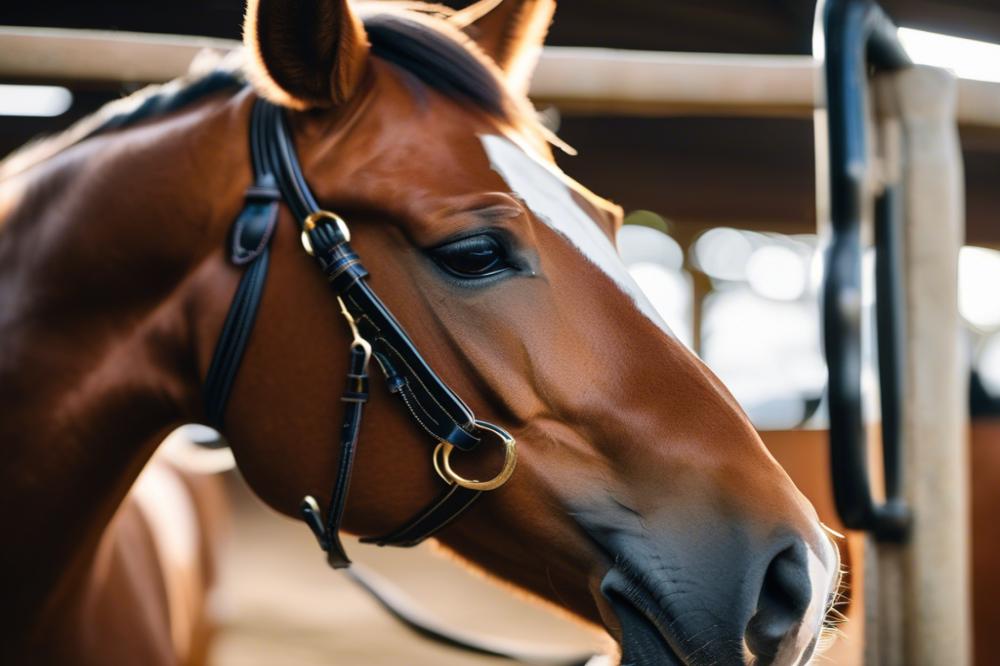Introduction
Maintaining a horse’s overall wellness involves paying close attention to its often-overlooked features: the eyes, ears, and mouth. These areas are crucial for a horse’s ability to sense its environment and communicate. Neglecting them can lead to serious issues that affect not only comfort but overall performance and health.
Common infections and irritations can occur in each of these regions. For instance, horses can develop conjunctivitis in their eyes, which creates discomfort and even vision problems. Ears can trap moisture and dirt, leading to infections like ear mites or other irritations. The mouth, where horses graze and chew, can suffer from issues such as dental problems or sores—conditions that can cause pain and affect eating.
Consequently, paying attention to eye ear mouth protection is vital. Infections can become severe if not treated promptly, leading to complications that extend beyond the localized areas. When horses experience pain or discomfort, it can affect their behavior, appetite, and even their athletic performance. Thus, maintaining the health of these features is fundamental to ensuring the well-being of the animal.
Understanding Common Infections and Irritations

Horses can suffer from a variety of infections and irritations affecting their eyes, ears, and mouths. Recognizing these problems early is crucial for their well-being. Eye issues often stem from irritants like dust, pollen, and strong sunlight. Conjunctivitis is a common eye infection. Symptoms may include redness, swelling, and excessive tearing.
Ear problems can arise from various sources as well. Flies, allergies, and even tick infestations can cause discomfort. Horse owners should look for signs like shaking their heads, scratching at their ears, or having a foul odor coming from the ear canal. These behaviors indicate that something may be wrong.
The mouth is another sensitive area for horses. Infections or irritations can develop due to dental issues or foreign objects lodged between teeth. You might notice excessive salivation, difficulty eating, or unusual smells. Problems like these can lead to more significant health issues if left untreated.
Environmental factors play a significant role in all these conditions. Horses exposed to dusty or muddy environments are more prone to eye irritations. High pollen counts can also trigger allergic reactions, affecting their overall comfort. Likewise, moisture can lead to ear infections, especially if horses spend time in damp conditions. Keeping living areas clean and dry can help reduce these risks significantly.
Proper care requires attention to detail. Observing your horse regularly can help catch problems before they escalate. Horse owners should remain vigilant about their animal’s daily habits and behaviors. Regular veterinary check-ups also play a critical role in maintaining a horse’s health.
Routine Grooming and Care Practices

Regular grooming is vital for keeping a horse healthy and comfortable. Not only does it remove dirt and debris, but it also helps to prevent infections and irritations. Grooming allows you to spot issues early, such as eye irritation or ear infections.
Begin with the eyes. Use a damp cloth to gently wipe away any discharge around the corners. This simple act can prevent bacteria buildup. Always check for swelling or redness that might signal a problem. If anything looks off, consult a veterinarian.
Ears also need attention. Horses can be sensitive, so approach grooming with care. Start by using your fingers to part the hair around the ears. A soft brush can help remove dust and debris. If you notice excessive wax build-up, a vet can guide you on the safest cleaning methods.
The mouth is another area that should not be overlooked. Regular checks can identify issues like sores or dental problems. Use a soft, moist rag to wipe the outside of the mouth and muzzle. This routine helps reduce irritation and keeps the area clean.
For effective grooming, certain tools can be beneficial. A good curry comb is excellent for loosening dirt and hair. A soft-bristled brush helps with finishing touches. Some owners find that using a hoof pick is essential for overall health. It can help prevent infections in the hooves, which might seem unrelated but is crucial.
Using antibacterial sprays can provide additional protection. Look for products specifically designed for equine use. Always read labels carefully before applying anything to your horse’s face or ears. Safety should always come first.
Establishing a grooming routine fosters trust between you and your horse. Regularly spending time together builds a strong bond. It also prepares your horse to accept care, making the process smoother for both of you.
Preventative Measures for Eye, Ear, and Mouth Health
Maintaining the health of a horse’s eyes, ears, and mouth requires proactive measures. Preventative care strategies are essential to fend off infections and irritations. Regular vaccinations play a crucial role in safeguarding against certain diseases. Consult with your veterinarian to create a vaccination schedule tailored to your horse’s specific needs.
Nutrition significantly impacts overall well-being. A balanced diet promotes a strong immune system, which helps fight off infections. Incorporating high-quality forage and grains is vital. Supplements containing vitamins and minerals can also aid in keeping horses healthy. In particular, Vitamin A is important for eye health.
Good hygiene habits are paramount for preventing issues. Start by cleaning the stable frequently, removing waste that can harbor pathogens. Dust and mold can be irritants, so ensure that bedding is dry and clean. Regular grooming reduces dirt around the eyes, ears, and mouth too. Use clean, soft cloths to wipe any discharge gently.
Creating a clean environment is part of good care. Keeping feed bins and water troughs clean discourages bacteria growth. Horses should have access to fresh, filtered water. When the living area is well-maintained, it lessens the chances of irritants affecting their sensitive areas.
Veterinary advice serves an essential role. Regular check-ups keep a watchful eye on potential problems. Your vet can recommend specific preventive treatments. They can also guide you on how to identify early signs of issues with your horse’s eyes, ears, or mouth.
Additionally, monitor your horse for any unusual behaviors. If your horse is rubbing its eyes or shaking its head more than usual, it could indicate discomfort. Timely intervention can prevent minor issues from developing into serious concerns.
Incorporating all these strategies will help maintain your horse’s health. By being proactive, you can minimize the risk of infections and irritations, allowing your horse to thrive.
Signs of Issues and When to Seek Veterinary Advice
Recognizing potential problems in your horse’s eyes, ears, or mouth is essential for maintaining their health. Several warning signs can indicate that something may be wrong. Watching for these signs will help you take timely action.
Increased tearing or discharge from the eyes can be a cause for concern. If you notice anything unusual, it’s important to act. Swelling around the eyes might indicate infections or allergic reactions. Look for signs like squinting or excessive blinking as well.
Ears also provide key indicators of distress. Pay attention to any unusual shaking or tilting. If the ears seem sensitive to touch, that could be a red flag. Moreover, watch out for debris or strong odors coming from the ear canal. These can signal infections or infestations.
The mouth deserves equal attention. Foul odor could suggest dental issues or infections. If you see excessive drooling, that might indicate discomfort as well. Horses may also show changes in their eating habits or exhibit signs of pain when chewing. These changes often require immediate attention.
It’s crucial to assess the severity of these symptoms. Minor issues may resolve quickly with proper care, but persistent signs should not be ignored. If you are ever in doubt, consult your veterinarian. Their expertise can provide peace of mind and ensure your horse is well cared for.
Timing can be everything. Early intervention can prevent more serious complications later on. If symptoms worsen or new signs appear, seeking veterinary advice becomes paramount. The health of your horse is a priority, and knowing when to ask for help can make all the difference.
Final Thoughts on Protecting Your Horse
Protecting a horse’s eyes, ears, and mouth is crucial for their overall well-being. These delicate areas are especially vulnerable to infections and irritations. Regular attention to grooming helps minimize potential health problems. Keeping these parts clean is not just about aesthetics; it plays a significant role in the animal’s comfort and happiness.
Many horse owners overlook the importance of proper care. Yet, establishing a routine can make a big difference. Strong hygiene practices can prevent issues before they arise. Always check for signs of irritation or infection during regular grooming sessions. Spotting problems early can save time, money, and distress for both the horse and the owner.
Encouragingly, simple steps can be taken to promote good health. Use appropriate grooming products that are gentle on sensitive areas. Rinse off sweat or dirt to reduce irritation. Paying close attention during care routines enhances not only physical health but also the bond between horse and handler.
In conclusion, prioritizing the eyes, ears, and mouth of your horse contributes significantly to their quality of life. Every small action counts when it comes to preventing infections and irritations. By adopting best practices in grooming and care, you are setting your horse up for a happier, healthier existence.



